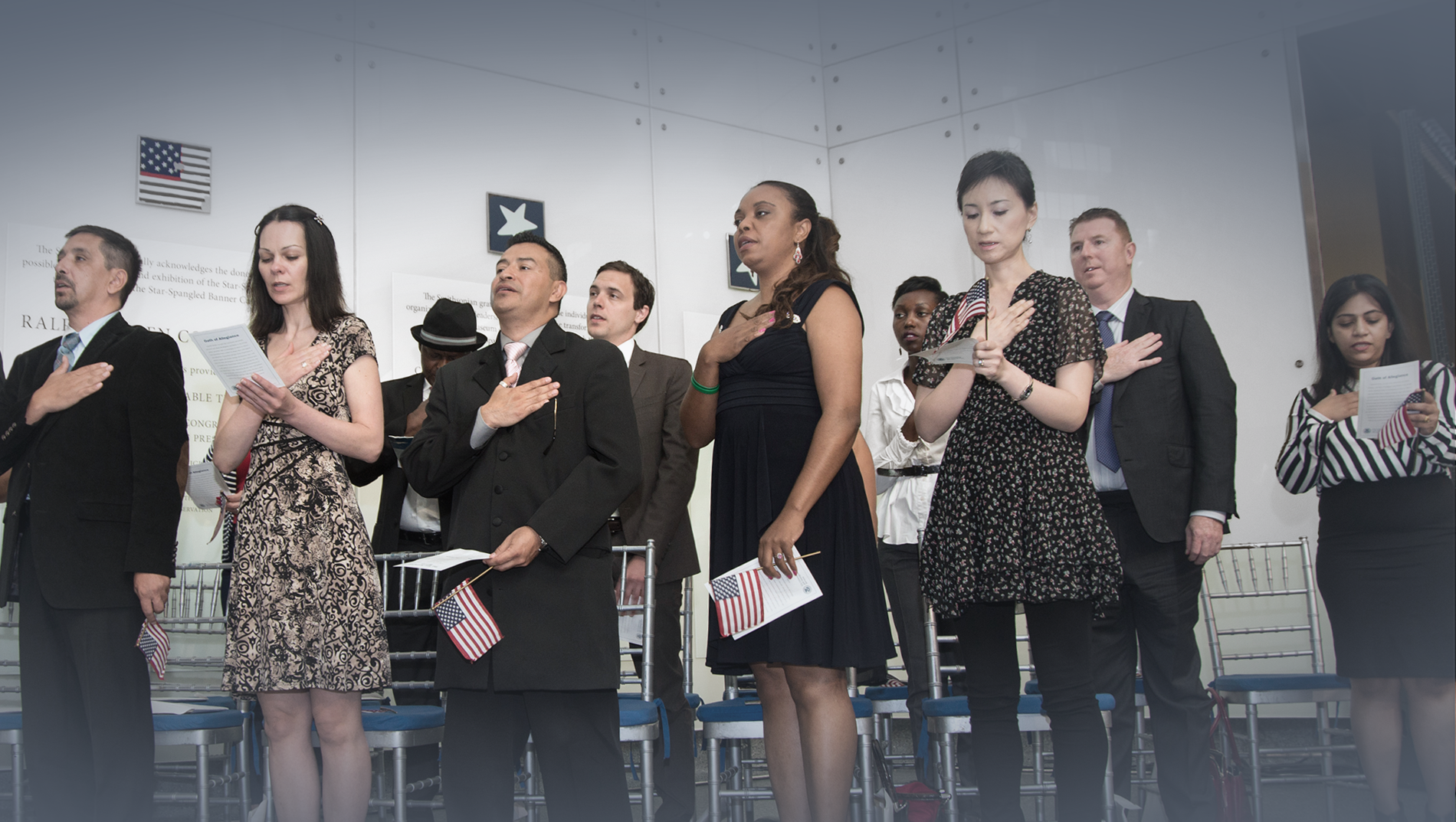Immigration 101
The U.S. immigration system is complex and can be difficult to understand. These resources provide key data points, historical information, and background on hot topics in immigration. Learn the basics about immigration. Immigration in the United States is complex and ever-evolving. Start here to understand the fundamental aspects of immigration policy, its history, and its impact on both individuals and the country at large. Learn commonly used terms about immigration law and how the U.S. immigration system is designed. Explore layered topics like how and whether immigrants can become citizens, as well as what individual protections look like under the law.
How the United States Immigration System Works
- How the Immigration System Works
- June 24, 2024
U.S. immigration law is very complex, and there is much confusion as to how it works. This fact sheet provides basic information…
Read More
Birthright Citizenship in the United States
- Birthright Citizenship
- October 16, 2024
This fact sheet explains birthright citizenship, the Fourteenth Amendment, and its interpretations. Who is…
Read More
Asylum in the United States
- Asylum
- August 27, 2014
Asylum seekers must navigate a difficult and complex process that can involve multiple government…
Read More
Restrictionist Group Blames the Children of Immigrants for America’s Budget Woes
The Center for Immigration Studies (CIS) released another report today attempting to blame our economic woes and budget shortfalls on immigrants—this time using the children of immigrants, most of whom are U.S. citizens, as scapegoats for benefits usage (here Medicaid, food assistance, cash assistance, and housing programs). As are most restrictionists’ attempts to blame immigrants for all of America’s problems, the report is rife with methodological problems. Despite the headline that 57 percent of households headed by an immigrant with children used at least one benefits program, compared to 39 percent for native households, the results actually show that when controlled for income, immigrant households use benefits at the same rate as native born households. Read More

The Diversity Immigrant Visa Program: An Overview
This fact sheet provides an overview of the diversity visa program, the requirements and security checks currently in place, and demographic information about recipients. Read More

New Census Data Suggest Nativists May Be Headed for Extinction
Newly released data from the 2010 Census reveal the rapid growth of something that is anathema to the nativist agenda: ethnic diversity. The data, analyzed in reports from the U.S. Census Bureau and the Pew Hispanic Center, show that the numbers of Hispanics and Asians in the United States are rising fast. This does not bode well for the anti-immigrant ideology of nativist politicians and their followers. Immigrants account for more than one-third of Hispanics and nearly two-thirds of Asians. Plus, more than one-quarter of both Hispanics and Asians are the native-born children of immigrants. As Hispanics and Asians come to comprise more and more of the population—and the electorate—nativists will become ever more marginalized. Read More

Constitutional Citizenship: A Legislative History
Attacks against the Citizenship Clause of the 14th Amendment have picked up in recent months, with legislators at both the national and state levels introducing bills that would deny U.S. citizenship or “state citizenship” to the children born to unauthorized immigrants in the U.S. There are two strands of attacks on birthright citizenship. One strand arises out of simple nativist anger at the impact of immigrants, legal or otherwise, on society. The other argues that the current interpretation of the Citizenship Clause as covering the children of “illegal” immigrants is inconsistent with the “original intent” of the Framers of the 14th Amendment. Originalism is often used as a method to clarify unclear portions of constitutional text or to fill contextual gaps in the document. This is not, however, how originalism is being used in the context to the Citizenship Clause. Here, originalists use clever arguments and partial quotations to eradicate the actual text of the Amendment. In essence, they claim the Framers did not really mean what they said. Read More

Report on Birthright Citizenship Low on Facts, High on Fantasy
Sometimes it’s easy to miss the most outlandish and unrealistic statements made in the immigration debate given the level of dialed up rhetoric. A recent report from the Center for Immigration Studies (CIS), however, appears to have been written to test just how far into the realm of fantasy the debate can be taken. In Birthright Citizenship for the Children of Visitors: A National Security Problem in the Making?, author W.D. Reasoner (a pseudonym) makes so many preposterous assumptions and calculations that one wonders whether the author used an alias to avoid embarrassment. Read More

Police Forum Recommends Limitations on Investigating Immigration Status
The role of local police in immigration enforcement continues to be a complex policy and legislative issue at both the state and federal level. State legislatures, for example, are contemplating bills designed to increase the role of local police in immigration enforcement while federal legislation targets cities with so-called “sanctuary policies.” And as programs like 287(g), Secure Communities and other federal/local partnerships continue to expand, local police are now more involved in identifying undocumented immigrants than ever before. Many law enforcement officers, however, find that enforcing federal immigration law may interfere with their ability to prevent crime and keep neighborhoods safe, so they have designed tailored local policies to ensure that they maintain the best possible relationship with their communities. In a new report by the Police Executive Research Forum (PERF), local police speak out on the difficulties of enforcing immigration laws and talk about best practices for navigating immigration issues in the future. Read More

The Wrong Side of History: Why the Anti-Immigrant Movement Will Always Lose
The anti-immigrant movement’s current motto could be “Desperate times call for desperate measures.” As evidence mounts that the demographic makeup of the country is changing, the current crop of immigration restrictionists know that they are gradually losing their committed base. Thus, they are pulling out every trick in the book to motivate that base to scream even louder. Most recently, House leaders of the movement tried to pit minorities, including Latinos, against immigrants by claiming that they are stealing all the low wage jobs. They are also trying to sell the point that America’s health care, public education and even environmental problems would all go away if we just deported 12 million people—desperate arguments, from a desperate group. Read More

Immigrants Are Not the Cause of Minority Unemployment and Low Wages
Nativists are fond of grandstanding over the plight of minority workers in the United States. While not particularly concerned with civil-rights issues, anti-immigrant activists are quick to cast themselves as defenders of the downtrodden when they blame immigrants for the high unemployment rates and low wages that are all too common among minorities. For instance, a recent hearing of the House Immigration Policy and Enforcement Subcommittee, entitled “Making Immigration Work for American Minorities,” featured a number of nativist stalwarts who claimed to have the best interests of minorities at heart as they held immigrants responsible for virtually every socioeconomic ill to befall minority communities. However, the best available evidence indicates that immigration is not the cause of dismal employment prospects and poor wages for American minorities. Read More

New Study on Immigrant Integration Compares and Ranks the United States, Canada, and Europe
Washington D.C. – In cooperation with the Immigration Policy Center, the British Council and the Migration Policy Group release a new study today which reviews and ranks U.S. immigrant integration policies against other countries. The Migrant Integration Policy Index (MIPEX: www.mipex.eu) contrasts and compares integration policies for legal immigrants… Read More

Some States Applying Brakes to Legislation Denying Citizenship to U.S.-Born Children
Yesterday, a panel in South Dakota’s legislature voted to halt legislation aimed at denying citizenship to U.S.-born children of undocumented immigrants. South Dakota’s bill—and others like it—propose measures which challenge the interpretation of the 14th Amendment, which states that, with very few exceptions, all persons born in the U.S. are U.S. citizens, regardless of the immigration status of their parents. While conservative lawmakers continue to introduce bills challenging the birthright citizenship clause, other states—like Arizona and Montana—are joining South Dakota's lead in deciding whether to move these bills forward. Read More
Make a contribution
Make a direct impact on the lives of immigrants.

